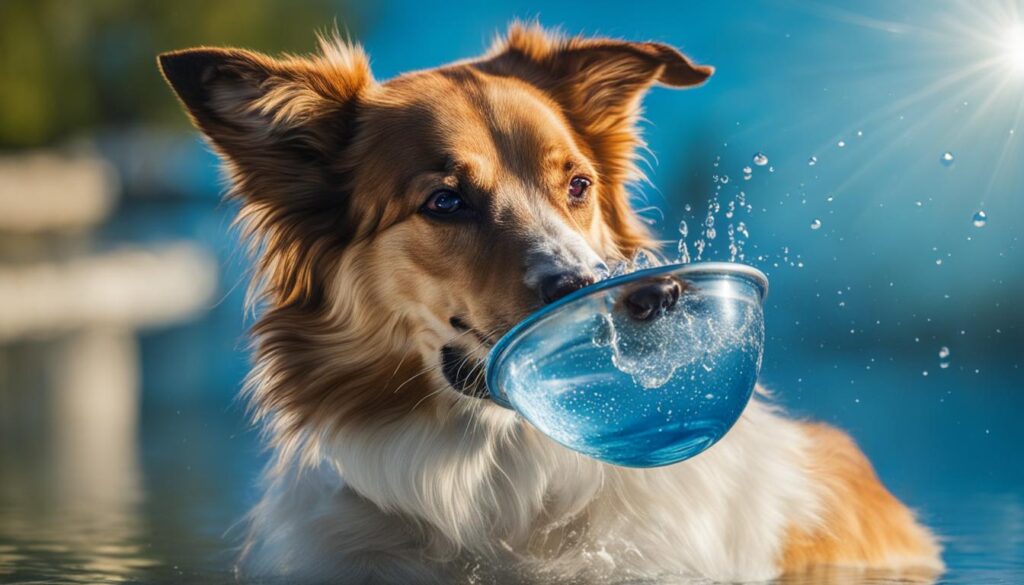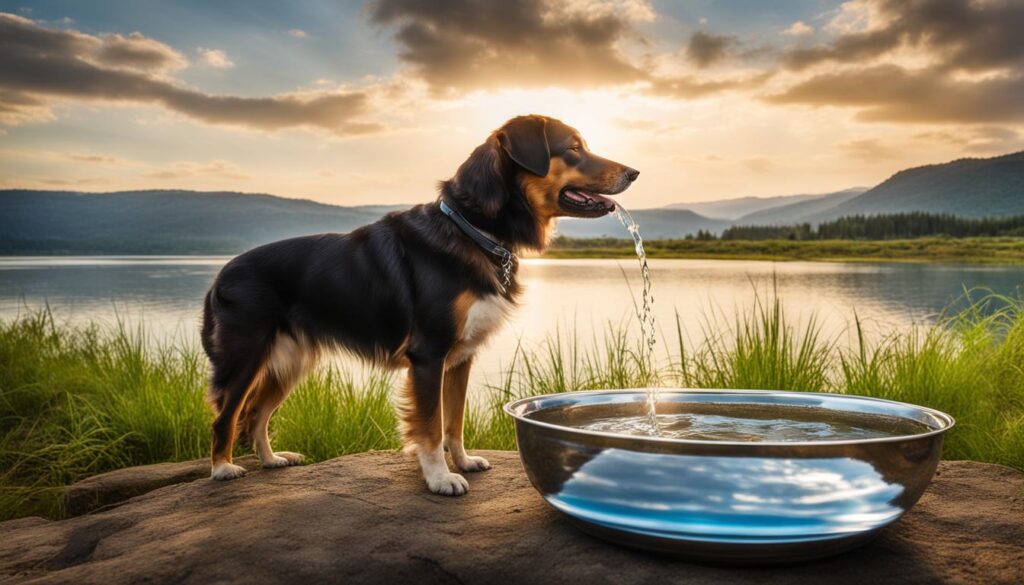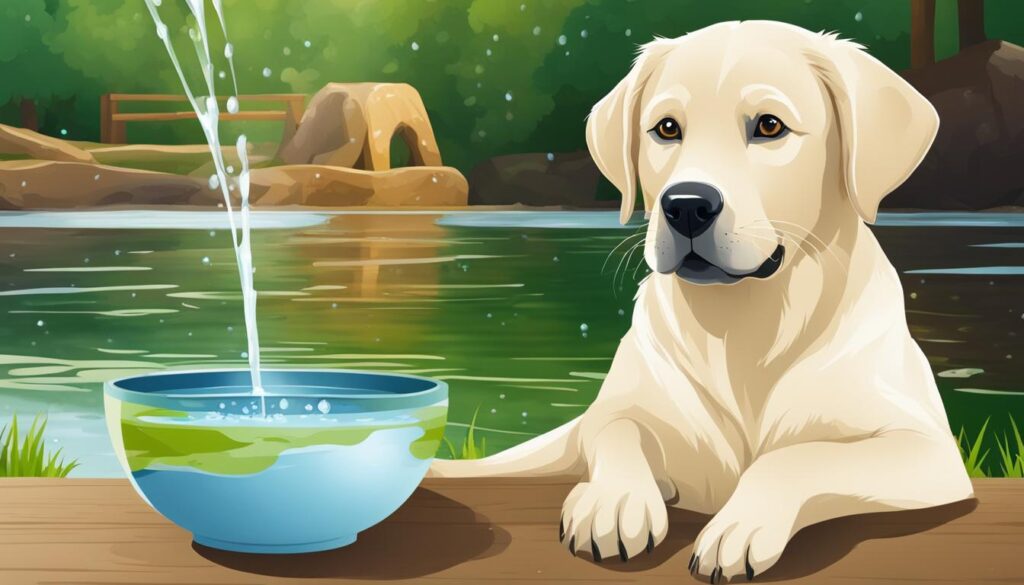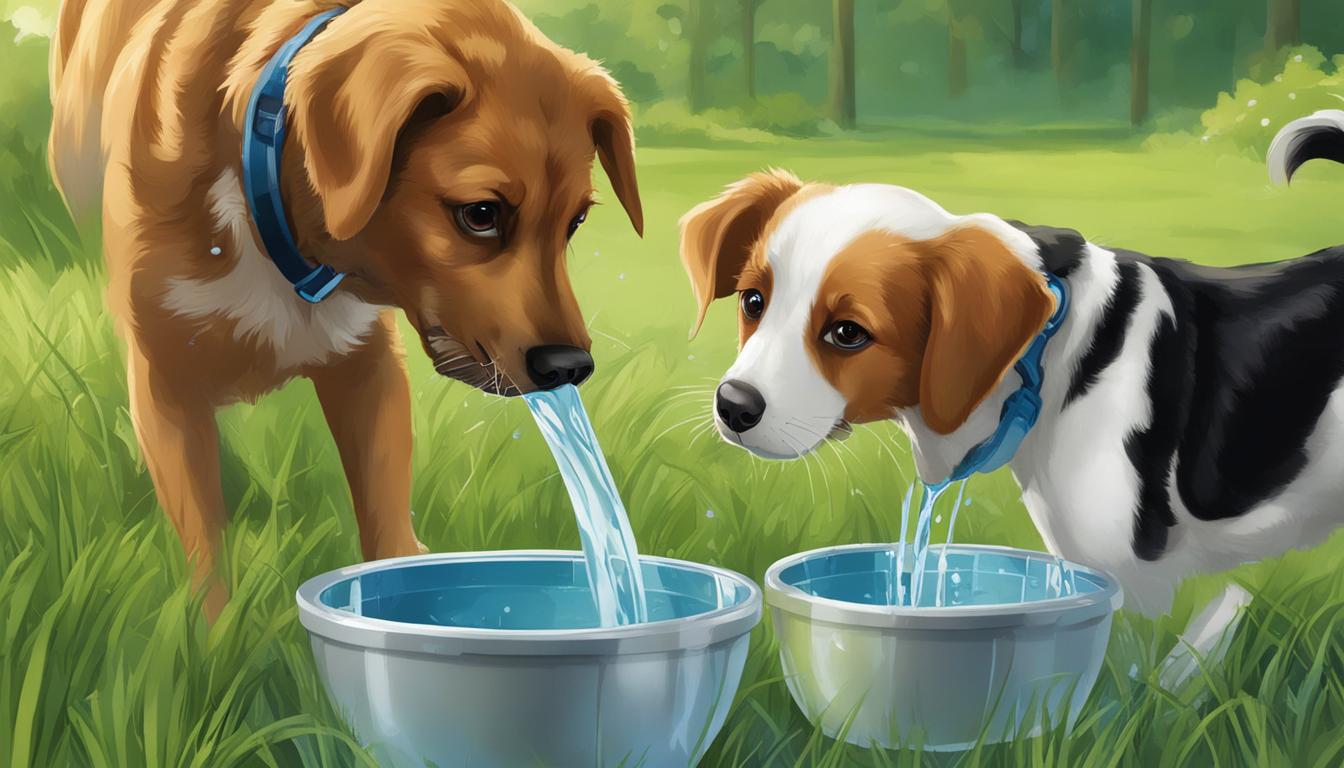Did you know that water is not just a thirst quencher for dogs? It’s actually an essential nutrient that plays a vital role in their overall nutrition and health. In fact, water makes up more than 70% of your furry friend’s body weight, emphasizing the importance of proper hydration.
Ensuring adequate hydration in dogs is crucial for various reasons. From digestion and nutrient absorption to organ function, water is involved in numerous bodily processes that contribute to your dog’s well-being.
Key Takeaways:
- Water is an essential nutrient for dogs, making up more than 70% of their body weight.
- Adequate hydration is necessary for proper digestion, nutrient absorption, and organ function.
- Monitoring your dog’s hydration and ensuring access to clean, fresh water at all times is vital.
- Active dogs and elderly dogs may have unique hydration needs that require extra attention.
- Water quality is important, so consider filtering tap water or using bottled water free from harmful chemicals.
The Impact of Hydration on Canine Health
Proper hydration is essential for maintaining optimal canine health. Dogs rely on water to regulate their body temperature, aid in digestion, and support organ function. Dehydration can have serious consequences for dogs, leading to organ dysfunction, decreased energy levels, and urinary tract problems. It is crucial for pet owners to be aware of the signs of dehydration in dogs and take proactive measures to ensure their furry friends stay properly hydrated.
Signs of dehydration in dogs include lethargy, loss of appetite, sunken eyes, and dry gums. If you notice any of these symptoms, it is important to take immediate action. Providing clean, fresh water at all times is the first step in promoting proper hydration. For active dogs, water breaks during exercise or playtime are crucial to replenish lost fluids. Consider using elevated water bowls to prevent strain on the neck and encourage comfortable drinking.
“A well-hydrated dog is a healthy dog.”
Monitoring your dog’s water intake is essential in ensuring adequate hydration. Keep an eye on how much water your dog is drinking and make adjustments if necessary. Adding wet or moistened food to their diet can increase their water intake and promote hydration. Regularly check your dog’s hydration levels by assessing their skin elasticity and monitoring their urine output.

| Hydration Tips for Active Dogs | Hydration Tips for All Dogs |
|---|---|
|
|
Remember, a well-hydrated dog is a healthy dog. By prioritizing hydration, you can contribute to your canine companion’s overall well-being and longevity.
Hydration Needs for Elderly Dogs
As dogs age, their hydration needs change and become even more crucial for their overall health. Elderly dogs may be more prone to dehydration due to decreased kidney function and a decreased sense of thirst. It is therefore important for pet owners to closely monitor their senior dog’s water intake and take steps to ensure they stay adequately hydrated.
One way to encourage elderly dogs to drink more water is by providing multiple water sources throughout the house. Placing water bowls in different rooms can make it easier for them to access water and remind them to drink. Additionally, wet or moistened food can be beneficial for increasing their water intake. The higher moisture content in wet food can help keep them hydrated while also providing necessary nutrients.
Regular visits to the veterinarian are crucial for monitoring the hydration levels of elderly dogs and detecting any age-related health issues that may impact their water intake. Your vet can provide specific guidance on how much water your senior dog should be consuming daily and may recommend additional measures to maintain their hydration levels.
Water Intake Guidelines for Dogs
It is important to note that water intake guidelines for dogs can vary based on several factors, including breed, size, activity level, and overall health. However, as a general guideline, dogs should consume approximately 1 ounce of water per pound of body weight daily. For example, a 50-pound dog should ideally drink about 50 ounces (or 6 cups) of water each day.
| Weight of Dog | Recommended Daily Water Intake |
|---|---|
| 10 lbs | 10 oz (1.25 cups) |
| 30 lbs | 30 oz (3.75 cups) |
| 50 lbs | 50 oz (6.25 cups) |
| 70 lbs | 70 oz (8.75 cups) |
| 90 lbs | 90 oz (11.25 cups) |
These guidelines can serve as a starting point, but it’s important to consult with your veterinarian to determine the specific water intake needs of your individual dog.

Additionally, when in outdoor environments, such as near lakes or ponds, it’s important to be cautious about the water sources your dog has access to. These natural bodies of water may contain bacteria or parasites that can be harmful if ingested. It’s best to prevent your dog from drinking from these sources and instead provide them with clean, fresh water.
Table: Comparing Water Sources for Dogs
| Water Source | Advantages | Disadvantages |
|---|---|---|
| Tap Water | Convenient and readily available | Potential contamination with synthetic chemicals and toxins |
| Bottled Water | Filtered and free from harmful substances | Can be more expensive and less environmentally friendly |
| Natural Bodies of Water | None | Potential contamination with bacteria or parasites |
By prioritizing water quality and ensuring your dog has access to clean, fresh water, you can help maintain their hydration and overall health.
Tips for Monitoring and Improving Your Dog’s Hydration
Proper hydration is crucial for your dog’s overall well-being. Monitoring and ensuring adequate hydration can help prevent health issues and promote optimal health. Here are some tips to help you monitor and improve your dog’s hydration:
1. Observe water intake:
Pay attention to how much water your dog is drinking daily. Monitor their water bowl and refill it regularly to ensure fresh water is always available. If you notice a significant decrease in their water intake, it may be a sign of dehydration.
2. Provide water breaks during exercise:
If your dog is active or enjoys regular exercise, make sure to provide water breaks during and after physical activity. Dogs can become dehydrated quickly, especially in hot weather. Offer them water at regular intervals to keep them hydrated.
3. Incorporate wet foods or add water to dry food:
If your dog is not drinking enough water, you can increase their moisture intake by incorporating wet foods into their diet or adding water to their dry food. This can help ensure they are getting enough fluids throughout the day.
4. Keep water bowls clean:
Regularly clean and wash your dog’s water bowls to prevent the buildup of bacteria or other contaminants. Dirty water bowls can discourage dogs from drinking, so keeping them clean is essential for encouraging hydration.
5. Assess skin elasticity and urine output:
Check your dog’s skin elasticity by gently lifting the skin on the back of their neck. If it quickly returns to its original position, it indicates adequate hydration. Additionally, monitor your dog’s urine output. Frequent urination and light-colored urine are signs of proper hydration.
By following these tips, you can effectively monitor and improve your dog’s hydration. Remember to consult with your veterinarian if you have any concerns about your dog’s water intake or hydration levels. Keeping your dog well-hydrated is key to their overall health and well-being.
Table: Signs of Dehydration in Dogs
| Signs | Description |
|---|---|
| Lethargy | Unusual tiredness and lack of energy |
| Loss of appetite | Decreased interest in food |
| Sunken eyes | Eyes appear sunken and lack moisture |
| Dry gums | Gums feel dry and sticky to the touch |

Remember, maintaining proper hydration is essential for your dog’s health and well-being. By implementing these tips and being mindful of their water intake, you can ensure your furry friend stays hydrated and happy.
Conclusion
In conclusion, water is an essential component of a dog’s diet and plays a vital role in their overall health and well-being. Adequate hydration is necessary for proper digestion, nutrient absorption, and organ function. By prioritizing your dog’s hydration, you can contribute to their longevity and overall quality of life.
As a responsible pet owner, ensuring your dog has access to clean, fresh water at all times is crucial. Monitoring their water intake, especially in active dogs and elderly dogs, is essential in maintaining optimal hydration levels. By observing their water intake, providing fresh water during exercise or hot weather, and incorporating moist foods, you can help ensure your dog stays adequately hydrated.
Remember, water is a vital nutrient that should never be overlooked in your dog’s diet. By understanding the importance of water in their nutrition and taking steps to ensure their adequate hydration, you can promote their overall health and prevent potential health issues. So, keep those water bowls filled and prioritize your furry friend’s hydration!
FAQ
How much water should my dog drink?
Dogs should consume approximately one ounce of water per pound of body weight daily.
What are the signs of dehydration in dogs?
Signs of dehydration in dogs include lethargy, loss of appetite, sunken eyes, and dry gums.
How can I ensure my active dog stays hydrated?
Tips for ensuring proper hydration in active dogs include providing water breaks during activity, using elevated water bowls to prevent strain, and monitoring water intake closely.
Do elderly dogs have different hydration needs?
Yes, elderly dogs may be more prone to dehydration and have decreased kidney function. It is important to monitor their water intake and ensure easy access to water at all times.
Should I be concerned about water quality for my dog?
Tap water can be contaminated with synthetic chemicals and toxins. Filtering tap water or using bottled water can help ensure the health and well-being of your dog.
How can I monitor my dog’s hydration?
Monitoring your dog’s water intake, observing their skin elasticity, and checking their urine output are all ways to monitor and improve hydration.





